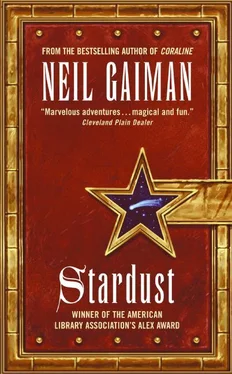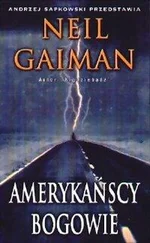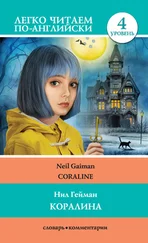They lay together, side by side.
The faerie woman adjusted her silk robe and was once more decorously covered. Dunstan pulled his britches back up, with regret. He squeezed her small hand in his.
The sweat dried on his skin, and he felt chilled and lonely.
He could see her now, as the sky lightened into a dawn grey. Around them animals were stirring: horses stamped, birds began, waking, to sing the dawn in, and here and there across the market meadow, those in the tents were beginning to rise and move. “Now, get along with you,” she said softly, and looked at him, half regretfully, with eyes as violet as the cirrus clouds, high in the dawn sky. And she kissed him, gently, on the mouth, with lips that tasted of crushed blackberries, then she stood up and walked back into the gypsy caravan behind the stall.
Dazed and alone, Dunstan walked through the market, feeling a great deal older than his eighteen years.
He returned to the cow byre, took off his boots, and slept until he woke, when the sun was high in the sky.
On the following day the market finished, although Dunstan did not return to it, and the foreigners left the village and life in Wall returned to normal, which was perhaps slightly less normal than life in most villages (particularly when the wind was in the wrong direction) but was, all things considered, normal enough.
Two weeks after the market, Tommy Forester proposed marriage to Bridget Comfrey, and she accepted. And the week after that, Mrs. Hempstock came to visit Mrs. Thorn of a morning. They took tea in the parlor.
“It is a blessing about the Forester boy,” said Mrs. Hemp-stock.
“That it is,” said Mrs. Thorn. “Have another scone, my dear. I expect your Daisy shall be a bridesmaid.”
“I trust she shall,” said Mrs. Hempstock, “if she. should live so long.”
Mrs. Thorn looked up, alarmed. “Why, she is not ill, Mrs. Hempstock? Say it is not so.”
“She does not eat, Mrs. Thorn. She wastes away. She drinks a little water from time to time.”
“Oh, my!”
Mrs. Hempstock went on,”Last night I finally discovered the cause. It is your Dunstan.”
“Dunstan? He has not…” Mrs. Thorn raised one hand to her mouth.
“Oh, no,” said Mrs. Hempstock, hastily shaking her head and pursing her lips, “nothing like that. He has ignored her. She has not seen him for days and days. She has taken it into her head that he no longer cares for her, and all she does is hold the snowdrop he gave her, and she sobs.”
Mrs. Thorn measured out more tea from the jar into the pot, added hot water.”Truth to tell,” she admitted, “we’re a little concerned about Dunstan, Thorney and me. He’s been mooning. That’s the only word for it. His work isn’t getting done. Thorney was saying that he needs some settling down, that boy. If he’d but settle down, why Thorney was saying he’d settle all the Westward Meadows on the lad.”
Mrs. Hempstock nodded slowly. “Hempstock would certainly not be averse to seeing our Daisy happy. Certain he’d settle a flock of our sheep on the girl.” The Hempstocks’ sheep were notoriously the finest for miles around: shaggy-coated and intelligent (for sheep), with curling horns and sharp hooves. Mrs. Hempstock and Mrs. Thorn sipped their tea. And so it was settled.
Dunstan Thorn was married in June to Daisy Hempstock. And if the groom seemed a little distracted, well, the bride was as glowing and lovely as ever any bride has been.
Behind them, their fathers discussed the plans for the farmhouse they would build for the newlyweds in the western meadow. Their mothers agreed how lovely Daisy looked, and what a pity it was that Dunstan had stopped Daisy from wearing the snowdrop he had bought for her at the market at the end of April, in her wedding dress.
And it is there we will leave them, in a falling flurry of rose petals, scarlet and yellow and pink and white.
Or almost.
They lived in Dunstan’s cottage, while their little farmhouse was erected, and they were certainly happy enough; and the day-to-day business of raising sheep, and herding sheep, and shearing them, and nursing them, slowly took the faraway look from Dunstan’s eyes.
First autumn came, then winter. It was at the end of February, in lambing season, when the world was cold, and a bitter wind howled down the moors and through the leafless forest, when icy rains fell from the leaden skies in continual drizzling showers, at six in the evening, after the sun had set and the sky was dark, that a wicker basket was pushed through the space in the wall. The guards, on each side of the gap, at first did not notice the basket. They were facing the wrong way, after all, and it was dark and wet, and they were busy stamping the ground and staring gloomily and longingly at the lights of the village.
And then a high, keening wail began.
It was then that they looked down, and saw the basket at their feet. There was a bundle in the basket: a bundle of oiled silk and woolen blankets, from the top of which protruded a red, bawling face, with screwed-up little eyes, a mouth, open and vocal, and hungry.
And there was, attached to the baby’s blanket with a silver pin, a scrap of parchment, upon which was written in an elegant, if slightly archaic, handwriting the following words:
Tristran Thorn
Chapter Two
in Which Tristran Thorn Grows to Manhood and Makes a Rash Promise
Years passed.
The next Faerie Market was held on schedule on the other side of the wall. Young Tristran Thorn, eight years old, did not attend, finding himself packed off to stay with extremely distant relations in a village a day’s ride away.
His little sister, Louisa, six months his junior, was, however, allowed to go to the market, and this was a source of great ranklement to the boy, as was the fact that Louisa brought back from the market a glass globe, filled with speckles of light that glittered and flashed in the twilight, and which cast a warm and gentle radiance into the darkness of their bedroom in the farmhouse, while all Tristran brought back from his relatives was a nasty case of the measles.
Shortly afterward, the farm cat had three kittens: two black-and-white ones like herself, and a tiny kitten with a dusty blue sheen to her coat, and eyes that changed color depending on her mood, from green and gold to salmon, scarlet and vermilion.
This kitten was given to Tristran to make up for missing the market. She grew slowly, the blue cat, and she was the sweetest cat in the world, until, one evening, she began to prowl the house impatiently, to mrowll and to flash her eyes, which were the purple-red of foxgloves; and when Tristran’s father came back from a day in the fields, the cat yowled, bolted through the door and was off into the dusk.
The guards on the wall were for people, not cats; and Tristran, who was twelve by this time, never saw the blue cat again. He was inconsolable for a while. His father came into his bedroom one night and sat at the end of his bed, saying gruffly, “She’ll be happier, over the wall. With her own kind. Don’t you fret now, lad.”
His mother said nothing to him about the matter, as she said little to him on any subject. Sometimes Tristran would look up to see his mother staring at him intently, as if she were trying to tease some secret from his face.
Louisa, his sister, would needle him about this as they walked to the village school in the morning, as she would goad him about so many other things: the shape of his ears, for example (the right ear was flat against his head, and almost pointed; the left one was not), and about the foolish things he said: once he told her that the tiny clouds, fluffy and white, that clustered across the horizon at sunset as they walked home from school, were sheep. It was no matter that he later claimed that he had meant simply that they reminded him of sheep, or that there was something fluffy and sheeplike about them. Louisa laughed and teased and goaded like a goblin; and what was worse, she told the other children, and incited them to “baa” quietly whenever Tristran walked past. Louisa was a born inciter, and danced circles around her brother.
Читать дальше








